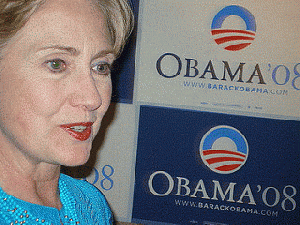p> Sanders rejects what the Democratic Party has become under the leadership of Bill Clinton and Barack Obama: a party for socially liberal members of the One (or .1 or .01 Percent. He opposes Hillary Clinton because she promises more of the same. And he has made political history by funding his campaign entirely from small individual donations, in an effort to shake the Democratic Party free from its corporate paymasters.
In the middle decades of the 20 th century, we had a two-party system very different from today's. It reflected the fundamental tension in a capitalist democracy between workers and owners of capital. Under FDR, Truman and Johnson, the Democratic Party supported unions, a progressive tax system and government programs that enabled the poor and middle class to get a fair share of the wealth produced by the American economy.
Republicans stood up for large corporations, pushed back against government intervention in the marketplace, and resisted unions. Yet this GOP was capable of moderation. For instance, in1952 President Eisenhower said, "Only a handful of unreconstructed reactionaries harbor the ugly thought of breaking unions." And President Nixon created the Environmental Protection Agency and expanded the Food Stamp Program.
However, the electoral triumph of Ronald Reagan in 1980 marked a tectonic rightward shift toward the two-party system we see today. In 1980 the country was longing for change after the Jimmy Carter years of stagflation--a combination of inflation, slow economic growth and high unemployment--capped by the hostage crisis in Tehran. Reagan blamed the nation's woes on "big government" (by which he meant the welfare state and regulation of markets).
Reagan made into an effective policy what Eisenhower called "the ugly thought of breaking unions." He fired 13,000 striking air traffic controllers, destroying their union. And he "gave dedicated union foes direct control of the federal agencies that were originally designed to protect and further the rights of workers and their unions" ( Dick Meister , Truthout). This reinforced a continuing national decline in union membership.
From 1948 to 1973 increases in worker compensation closely tracked increases in productivity (output per work hour). In other words, the rising tide of wealth created by our economy lifted all boats.
Since then, a gap that opened up under Jimmy Carter has steadily increased. Productivity has grown by 72.2%, while hourly pay has gone up only 9.2% (Economic Policy Institute). From 1978 to 2014, inflation-adjusted CEO compensation at the top 350 U.S. firms increased nearly 1000%, while average worker compensation rose only 10.9%.
The top marginal tax rate was 91% under Eisenhower, and 70% under Carter. Reagan reduced it to 28%. In 1981, according to the CQ Researcher, "Congress. . . enacted the largest spending and tax cuts in its history," and 70% of those cuts were in programs affecting the poor. Reagan launched the present era of American history in which the rich get much richer and the poor get poorer.
In 2015 the average member of the Forbes 400 wealthiest Americans had a net worth of $5.8 billion, over 10 times the 1982 average after adjusting for inflation. As Warren Buffett famously said of this era, "There's class warfare, all right, but it's my class, the rich class, that's making war, and we're winning."
As the post-1980 GOP became implacably anti-union and anti-government (except for military spending), how did the Democrats react? How did Bill Clinton and Barack Obama respond to soaring economic inequality and the radicalization of the GOP? They followed the money.
Both Democratic presidents turned their backs on the weakened and shrinking union movement despite labor's continuing loyalty to the party. With Republican and Big Business support, and against the bitter opposition of unions, both presidents pushed for massive free-trade agreements that force American workers to compete against poorly paid workers in unsafe workplaces abroad.
The most striking and damaging development in the post-Reagan Democratic Party was its tight embrace of Wall Street during the Clinton and Obama presidencies. Bill Clinton received $39.7 million in campaign donations from the financial sector. He showed his gratitude by passing the massive deregulation of investment banking that led to the near-collapse of the world economy in 2007-08.
Hillary Clinton has already outdone her husband. She received $2,935,000 from 2013 to 2015 for 12 speeches to large financial institutions, and $21.4 million in donations from the financial sector for her 2016 campaign. According to the Washington Post, "donors from Wall Street and other financial services firms have given $44.1 million [since 2000] to support Hillary Clinton's campaigns and allied super PACs."
Of course, as Clinton herself said on Morning Joe recently, "Barack Obama took more money from Wall Street than any candidate who's ever run for president." According to Open Secrets, his total was $64.1 million. It was money well spent.
Not a single Wall Street executive was indicted by Obama's 'Justice' Department for the long list of crimes they committed in the years leading up to the crash of 2007-08. For neglecting to uphold U.S. law on this massive scale, Obama should have been impeached. The leader of the Democratic Party that used to see itself as the party of the people has, in effect, licensed super-rich bankers to steal from the people. And now another Wall Street crony seems poised to capture the party's nomination for president.
(Note: You can view every article as one long page if you sign up as an Advocate Member, or higher).






